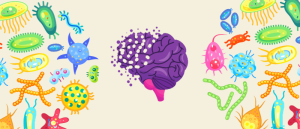Investigating the molecular pathways underlying variable risk of Alzheimer’s disease

 Jamaine Davis (left) is an Associate Professor at the Meharry Medical College (TN, USA). Initially trained as a biophysicist, Davis picked up a fascination for proteins and their behavior in a biology course during his post-bac studies. During this time, his research mentor planted the seed of studying for a PhD and the impact that he could have in the symbiotic world of mentoring and research.
Jamaine Davis (left) is an Associate Professor at the Meharry Medical College (TN, USA). Initially trained as a biophysicist, Davis picked up a fascination for proteins and their behavior in a biology course during his post-bac studies. During this time, his research mentor planted the seed of studying for a PhD and the impact that he could have in the symbiotic world of mentoring and research.
Here, Davis reveals the importance of mentoring in his career, his fascinating work exploring genetic variation in proteins associated with Alzheimer’s and how these variants may help to paint part of the picture that explains how and why African Americans have an increased risk of developing Alzheimer’s disease.
Please tell us about your path to a career in research and your current area of expertise.
During grad school, I was amazed by the fundamentals of biology and life and how structural biology plays a key role in health and medicine. My graduate training applied biochemical and biophysical techniques to understand how Mycobacterium tuberculosis went into a dormant phase.
I chose my thesis mentor based on his work in M. tuberculosis. For my postdoctoral training, I chose a scientist known to be a great mentor. This led me to the National Cancer Institute at Frederick now called Frederick National Labs (MD, USA) because a trusted colleague spoke highly of her postdoc mentor. In my postdoc, I continued working on infectious proteins and solved the structure of a bacterial effector protein implicated in Shigellosis; however, I decided that I wanted to write a K grant and was only eligible to apply to the NCI Transition Career Development Award (K22) mechanism. Luckily, I was awarded the K grant, which started my independent career. This led me to a faculty position at a historically Black college/university (HBCU) Meharry Medical College, which is one of the nation’s oldest and largest historically Black academic health science centers.
What is the focus of your lab’s work?
There are two seemingly disparate questions that the work in my lab attempts to address. The first is, what role does genetic ancestry play in the risk, manifestation and treatment of diseases, such as cancer and Alzheimer’s disease? The genetic background of patients needs to be considered if we aim to truly achieve precision medicine for all. Furthermore, considerable evidence highlights that disease manifestation and treatment can vary across racial/ethnic groups. One of our goals is to identify novel treatment strategies for populations most at risk for diseases (cancer and Alzheimer’s).
One particular avenue that we are pursuing for this research question is an investigation of the ATP-binding cassette protein ABCA7, which confers risk for Alzheimer’s disease. We have a particular focus on the effects of genetic variants of this protein identified in African Americans, and understanding how changes in the protein structure impact its function and can lead to Alzheimer’s development. We anticipate that studying this pathway will reveal new targets to help reduce or treat African Americans who may carry these distinctive genetic variants.
The second question we attempt to address is, what role does basic science information play in building public trust? The public trust in science and scientists has declined since the beginning of the COVID-19 pandemic. Improved public trust in science and clinical trials is needed in the pursuit of achieving precision medicine for everyone. Our work studying COVID-19 vaccine hesitancy and uptake has revealed that the public wants to understand the science, and they want reliable information from trusted sources.
We are applying what we have learned from COVID-19 to other diseases, like Alzheimer’s, to determine if we can increase intent to enroll in clinical trials. One of our long-term goals is to use the dissemination of basic science information to increase clinical trial diversity.
 Could a virus be the missing piece of the Alzheimer’s puzzle?
Could a virus be the missing piece of the Alzheimer’s puzzle?
Ruth Itzhaki has studied the link between pathogens and Alzheimer’s, despite antipathy from the scientific community, a journey she details in this interview with Aisha Al-Janabi.
What techniques do you use to explore the genetic variants of ABCA7?
We use a combination of techniques to explore how genetic variants of ABCA7 confer AD risk in African Americans. ABCA7 is a protein that lies within the plasma membrane of cells and to study its function, we are using two types of microscopy to study its behavior, total internal reflective fluorescence (TIRF) microscopy and cryogenic electron microscopy (CryoEM).
We also use standard biochemical and cell-based techniques to investigate how proteins and molecules interact. We hope to further our understanding of how this protein and its variants function inside and outside the cell.
Do you have any tips for best practice when using these techniques?
Proteins are such dynamic molecules; some are very stable and easy to work with, while others can be difficult, so it’s important to remember that the images that you capture provide only a snapshot of the protein’s structure at that point in time. Proteins can have multiple structural conformations depending on the environment they are in. CryoEM is a really hot topic and is a technique that will continue revolutionizing the level of detail that we can see in cells. The biggest challenge is always getting a good sample. Although it may be difficult to discern this when reading research articles, but a lot of work goes into making good and clean (pure) protein samples for CryoEM.
You mentioned that African Americans are at a greater risk of Alzheimer’s. Have you been able to glean any insights into why this may be the case?
Why African Americans are at a greater risk of Alzheimer’s is a much bigger question that will need an interdisciplinary team to answer. My work provides insights into how African Americans with distinct genetic variants – which change a single amino acid in the protein sequence (missense mutation) – might be at risk for developing Alzheimer’s and the possible strategies to develop novel treatments for this group of people.
One thing we must appreciate is that not all genetic variants are equal. This means that although two people may have the same genetic background and hence genetic variation, only one of the two may develop Alzheimer’s. As a membrane-bound protein, ABCA7 works to help to regulate the levels of many types of lipids, which are important for overall brain health. What we think we are learning is that distinct missense variants of ABCA7 may impact the levels of key lipids and that this may influence the development of the amyloid plaques, which are a hallmark of Alzheimer’s.
If there was one thing you could ask for to help with your research, what would it be?
I’ve given this some thought and seem to keep circling back around to more money/funding. Honestly, I am always asking for money since I have to write grants to support the work. Funding will allow me to hire more staff with key expertise to help tackle some of the many outstanding questions in the field.





